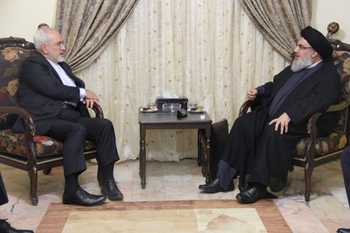
RNA - Sayyed Nasrallah received Dr. Zarif and the associating delegation, said a statement released by Hezbollah Media Relations, adding that the meeting was attended by the Iranian ambassador in Lebanon Mohammad Fatahali.
Hezbollah S.G. and Zarif discussed latest developments in Lebanon and the region, the statement said.
The meeting also tackled efforts aimed at finding solutions to the current crises in several countries, as well as the outcomes of the nuclear agreement reached between Iran and the world powers last month in Vienna, the statement added.
On July 14, Iran and the P5+1 countries - the US, France, Britain, Russia and China plus Germany - finalized the text of the nuclear agreement, dubbed the Joint Comprehensive Plan of Action (JCPOA), in Vienna over Tehran's nuclear program.
The Iranian minister said resistance and peaceful coexistence among divine religions play a constructive role in establishing peace and boosting development in the region.
Zarif added that the resistance movement has restored dignity to Lebanon and the region, and has led to respectful coexistence among all Lebanese tribes and groups.
He expressed hope that more consultations and talks would help work out logical solutions to the ongoing problems in the region, particularly in Lebanon.
The top Iranian diplomat also pointed to the conclusion of nuclear talks between Iran and the P5+1 countries and said, “The nuclear agreement will have positive consequences on regional developments.”
He emphasized that dialog and diplomacy would help settle the current regional problems emanating from the Israeli regime’s divisive policies and the extremist approaches adopted by terrorist groups.
Positive JCPOA effects on Middle East
Nasrallah, for his part, commended the nuclear agreement between Iran and the six global powers and said the JCPOA would have positive and valuable outcomes for Lebanon and the entire region.
He said the resistance front and Hezbollah are making efforts to counter threats to regional nations.
The resistance front seeks to protect Lebanon and the region against dangers posed by the enemies who intend to trigger insecurity, destroy infrastructure and harm peaceful coexistence.
The Iranian foreign minister arrived in Beirut at the head of a delegation on Tuesday on the first leg of his second regional tour following the nuclear agreement between Iran and six world powers.
Earlier on Wednesday, Zarif met with Lebanese Defense Minister Samir Moqbel. Zarif on Tuesday sat down with Lebanese Prime Minister Tammam Salam. He also attended a press conference after the meeting and expressed Iran’s support for the Lebanese nation.
R111/108/A/